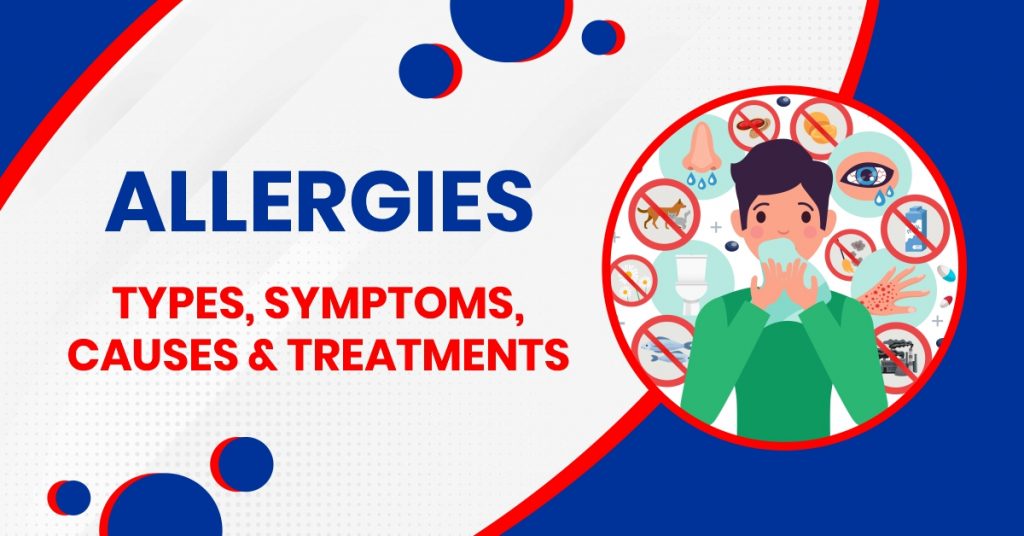The immune system reacts to a foreign substance, such as pollen, bee stings, pet dander, or a food that most people do not react to.
Antibodies are substances produced by your immune system. Allergies are caused by the immune system creating antibodies to identify an allergen as harmful, even if it is not. An allergen can cause your immune system’s response to inflame your skin, nasal passages, airways, and digestive system when you come into contact with it.
An allergic reaction differs from person to person in severity. Minor irritation may lead to anaphylaxis, an emergency that can be life-threatening. Treatments can help relieve allergy symptoms, but many allergies can’t be cured.
What is an Allergy?
Immune system responses to foreign substances are exaggerated in an allergy. The immune system usually perceives these foreign substances as harmless and doesn’t cause a reaction in nonallergic individuals.
When an allergic individual comes into contact with a substance, the immune system recognizes it as foreign and responds accordingly.
Allergens are substances that cause allergic reactions, such as pollens, dust mites, molds, animal proteins, foods, and medications.
A person with allergies responds to an allergen with an IgE antibody when they come into contact with it. The term “allergenic” or “atopic” is used to describe people with allergies.
Symptoms of Allergies:
Different types of allergies have different symptoms. The following symptoms are associated with allergic rhinitis or hay fever:
- You feel itchy in your nose, eyes, or upper lips
- Flu-like symptoms and runny nose
- Unstoppable sneezing
- Eyes red, watery, swollen, or conjunctivitis
The following symptoms are associated with drug allergies:
- Rashes
- Anaphylaxis
- Itchy skin
- Swelling of the face
- Heavy breathing or wheezing
- Skin redness
The following symptoms are associated with insect sting allergies:
- Under your sting site is an area of water retention or edema
- Itching and redness throughout the body
- An asthma attack can be characterized by coughing and shortness of breath.
- Anaphylaxis
Food allergies have the following symptoms:
- There is a sensation of tingling in your mouth
- Body redness
- Anaphylaxis
- Lips, tongue, and throat swell
The following symptoms are also present in eczema (an allergic reaction to the skin):
- Flakiness or peeling of the skin
- Redness over the entire body
- Itchiness on the entire body
Types of Allergies on The Skin:
Whenever your body identifies a certain substance as harmful, this is called an allergy. As a result, you experience an allergic reaction. Allergens cause allergic reactions in people.
Allergies take many forms. Some allergies occur seasonally, while others are perennial. There are also lifelong allergies.
Creating a plan to manage your allergy should be done in collaboration with your health care provider. You should avoid your allergens to prevent allergic reactions.
- Drug Allergy: Drugs (medicines) can cause allergies in a very small percentage of people. There are many side effects associated with medicines that aren’t allergic reactions. It is usually only based on the history and symptoms of the patient that the cause of the reaction can be determined. In some cases, skin testing is done for drug allergies.
- Food Allergy: Allergies to foods can take a variety of forms. Different types of allergies are mediated by IgE, non-mediated by IgE, and food intolerances are caused by non-mediated IgE.
- Insect Allergy: A stinging insect that causes an allergic reaction is a bee, a wasp, a hornet, a yellow jacket, or an ant. It is also possible to develop an allergy to non-stinging insects. Typically, cockroaches and dust mites are found in homes and offices. Asthma and allergies are often triggered by allergies to these two insects.
- Latex Allergy: Natural rubber latex allergy is an allergic reaction to the substance. Many products containing natural rubber latex, such as gloves, balloons, condoms, and others, are made of natural rubber latex. Latex allergy causes serious health problems.
- Mold Allergy: The fungus that causes mold and mildew is a fungus. All year round, allergies can be caused by fungi because they grow in so many places both inside and outside.
- Pet Allergy: It is common for people with allergies to have pets with fur. Dogs and cats are not available in allergy-free (hypoallergenic) breeds.
- Pollen Allergy: Allergies to pollen are common during the spring and summer. Pollen allergy is sometimes called ‘hay fever,’ but it’s more commonly known as ‘seasonal allergic rhinitis.’
Causes of Allergies:
Normally harmless substances can trigger an allergic reaction when your immune system mistakenly perceives them as dangerous invaders.
Affected individuals’ immune systems then produce antibodies against that allergen for the rest of their lives. Allergy symptoms occur when your immune system releases chemical compounds in response to the allergen, such as histamine.
The following are common allergy triggers:
- Mold and dust mites, as well as pollen and animal dander, are airborne allergens
- Nuts, tree nuts, milk, eggs, fish, shellfish, wheat, soy, peanuts, and tree nuts, among others
- Bee stings and wasp stings
- Medicines, particularly penicillin or antibiotics containing penicillin
- You can have an allergic reaction to latex or other materials you touch
Natural remedies for allergies:
Allergies can affect anyone – though they usually appear after age 3 and peak in adolescence or late childhood. Symptoms can begin as early as February and last until September, depending on your location and the allergen.
There are some natural DIY methods to relieve allergic symptoms that can be effective, as well, such as antihistamines and steroid nasal sprays. Here are some natural home remedies to try for seasonal allergies.
1. Refreshing Citrus Drinks
Allergies are more likely to occur during spring when the scorching heat of the sun gets harsher each day. Drinking iced drinks makes you feel more refreshed. Vitamin C, found in citrus fruits, not only stimulates and refreshes your body but also helps you fight seasonal allergies by boosting your immune system. Consume these fruits as often as possible to stay healthy.
2. Red Onion Water
The chemical compound quercetin is found in onions, which may reduce the body’s production of histamine, as a result reducing allergy symptoms.
Pollen triggers the release of a chemical compound in the body called histamine, which causes the immune system to respond. The result is antibodies that fight off the allergens.
As well as causing certain reactions in the body, such as sneezing, histamine also causes certain physiological reactions in the body. Natural anti-histamines include onions. As a bronchodilator, quercetin also helps you breathe easier since it opens your airways.
3. Apples and Walnuts
If you suffer from allergies, walnuts can help ease your symptoms. The magnesium in these foods helps reduce wheezing and coughing.
Vitamin E contained in them boosts immunity and protects against allergic reactions. As with onions, apples contain quercetin, which naturally reduces histamine levels. Studies have shown that eating an apple a day prevents allergies.
4. Hot and Spicy Food
Hot and spicy foods thin down mucus secretions in the nose, making it clearer and easier to breathe. The results are improved breathing capacity.
When you consume spicy foods, your body naturally loosens mucus and phlegm that clogs your system. Among the spicy foods are chili peppers, horseradish, and wasabi. You should avoid eating too much of everything.
How Allergies Are Diagnosed?
Allergies cannot be diagnosed based on blood or skin test results alone. Any test results, whether from a blood test or an imaging test, must be interpreted in conjunction with your medical history.
Human allergic disease is as much influenced by an individual’s medical history as by the results of allergy tests. It is the medical history that relates to allergy tests and allergy-related illnesses.
By completing this form, the allergist will learn about your general health, your experiences with potential allergens, and your symptoms throughout the year.
An allergist relies on their training and experience along with a patient’s medical history and a physical examination in addition to skin and blood allergy tests if the results are unclear or inconsistent with the patient’s medical history.
Preventing Symptoms of Allergies:
There are some things you can do at home to reduce allergic reactions. Generally, the following are safe and low-cost products with varying degrees of research support:
- When pollen counts are expected to be high and you have an allergy to pollen, stay inside with your doors and windows closed. Every region of the United States is provided with pollen and mold updates by the National Allergy Bureau.
- High-efficiency particulate air filters (HEPA) can be used. This type of filter traps airborne allergens.
- In the event that you already have an allergic pet, stay away from the animal, and wash your hands right after handling it. Touching an animal can cause you to touch your eyes, nose, or mouth.
- Keep a diary when you are trying to figure out which allergens may cause or worsen your symptoms. Keep track of your food intake and activities to identify triggers.
- Reduce your exposure to dust mites, pet dander, pollen, and other airborne irritants by washing your bedding frequently in hot water.
- In case of an emergency, a necklace or bracelet that alerts people to your allergies can help.
Complications of Allergies:
Some allergic reactions can actually be life-threatening. Allergies are commonly associated with those pesky sniffles and sneezes that come around every new season.
A serious allergic reaction, such as anaphylaxis, occurs when an allergen is exposed. Anaphylaxis is most commonly associated with food, but any allergen can trigger it:
- A sudden narrowing of the airways
- Increasing heart rate
- Tongue and mouth swelling may occur
Many complications can arise from allergy symptoms. Depending on the severity of your symptoms, your doctor can determine whether it is due to a sensitivity or a full-blown allergy.
As well as teaching you how to handle allergy symptoms, your doctor can also help you avoid the worst complications.
How are allergies treated?
Allergies can be prevented by staying away from whatever triggers the reaction. Treatment may be necessary if this isn’t possible.
Medication:
For the control of allergy symptoms, medications like antihistamines are often used. The medications can be either over-the-counter or prescription. Your physician will recommend a medication based on the severity of your allergies.
Medication for allergies includes:
- antihistamines like diphenhydramine (Benadryl)
- corticosteroids
- cetirizine (Zyrtec)
- loratadine (Claritin)
- cromolyn sodium (Gastrocrom)
- decongestants (Afrin, Suphedrine PE, Sudafed)
- leukotriene modifiers (Singulair, Zyflo)
Immunotherapy:
Immunotherapy is often chosen by many people. Several injections are needed over the course of several years to get your body used to the allergy. Successful immunotherapy can reduce the likelihood of allergy symptoms recurring.
Emergency epinephrine:
Having an epinephrine shot on hand can save your life if you have a severe, life-threatening allergy. You can counter allergic reactions until help arrives. EpiPens and Twinjects are popular brands of this treatment.
There are some allergic reactions that are medical emergencies. Be prepared by knowing how to administer first aid in allergic reaction situations.





















 Disclaimer: The information on the Web Site is provided for informational purposes only and is not meant to substitute the advice provided by our doctor or other health care professional. You should not use the information available on or through the Web Site for treating a health problem or disease or prescribing any medication. All images used on this website are for illustrative purposes only,
Disclaimer: The information on the Web Site is provided for informational purposes only and is not meant to substitute the advice provided by our doctor or other health care professional. You should not use the information available on or through the Web Site for treating a health problem or disease or prescribing any medication. All images used on this website are for illustrative purposes only,